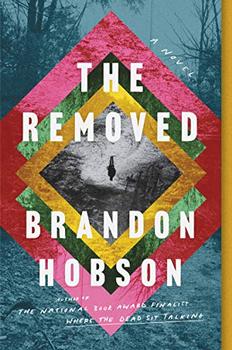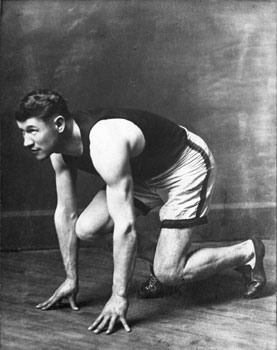Summary | Excerpt | Reviews | Beyond the Book | Read-Alikes | Genres & Themes | Author Bio

Critics' Opinion:
Readers' Opinion:
First Published:
Feb 2021, 288 pages
Paperback:
Oct 2021, 288 pages
 Book Reviewed by:
Book Reviewed by:
Lisa Butts
Buy This Book
This article relates to The Removed
 In The Removed, Edgar visits a mysterious town called the Darkening Land, where his high school friend Jackson tells him about a video game he's designing featuring the Native athlete Jim Thorpe. Thorpe was a multi-sport talent, notable for his careers in baseball and football, along with competing in the 1912 Olympics in Stockholm in track and field events.
In The Removed, Edgar visits a mysterious town called the Darkening Land, where his high school friend Jackson tells him about a video game he's designing featuring the Native athlete Jim Thorpe. Thorpe was a multi-sport talent, notable for his careers in baseball and football, along with competing in the 1912 Olympics in Stockholm in track and field events.
There are no official records to verify, but Thorpe is believed to have been born in 1887 or 1888 in the area of present-day Prague, Oklahoma, which was Indian territory at the time. Both of his parents were members of the Sac and Fox Nation. As a child he attended local schools, but at 16, while he was still struggling with the loss of his brother to pneumonia and his mother who died in childbirth, he was sent to the Carlisle Indian Industrial School in Pennsylvania. Thorpe joined Carlisle's track and field team and its football team, where he quickly distinguished himself as a rare talent under legendary coach Glenn "Pop" Warner. Playing for Carlisle, Thorpe competed against West Point, a team that included future president Dwight D. Eisenhower, who later remarked, "On the football field there was no one like him in the world...no other athlete possessed his all-around abilities in games and sports."
In 1912, Thorpe was selected to compete in the Stockholm Olympic Games in the pentathlon and decathlon events. He won both, becoming the first Native American athlete to earn a gold medal in the Olympics. Sweden's King Gustav V declared Thorpe "the greatest athlete in the world." However, at the time, there was a rule barring professional athletes from competing in the Olympics (this rule was rescinded in 1986), and when it was discovered that Thorpe had played two seasons of semi-professional baseball for North Carolina's Rocky Mount team prior to the Stockholm Games, he was stripped of his medals.
In the years following the Olympics, Thorpe played professional baseball in the National League for the New York Giants, Cincinnati Reds and the Boston Braves. His career batting average was a respectable .252 (scoring 91 runs and driving in 82 in seven years of play), but he developed a penchant for drinking and fighting that often troubled his coaches.
Simultaneously, Thorpe was playing professional football, first for the Canton (Ohio) Bulldogs, and then for the Cleveland Indians. He's considered remarkable in large part for his versatility, playing offense, defense and special teams (kicking) positions equally well (which was rare then, but is unheard of in the sport today). A dynamite kicker, legend has it he visited the old Carlisle football field in 1941 at the age of 52 and kicked a field goal from the middle of the field wearing his street shoes.
He also played and coached for an all-Native team out of Ohio called the Oorang Indians. Unfortunately, owner Walter Lingo treated the team as a "publicity stunt," complete with demeaning sideshow attractions like tomahawk throwing contests that distracted from the games. On at least one occasion, a player wrestled a bear.
After retiring from football at age 41, Thorpe acted bit parts in numerous movies, including King Kong (1933), and a slew of B-movie Westerns. He died in 1953 after suffering a heart attack, and his death incited a major rift between his wife and children. According to Bleacher Report, Thorpe had asked to be buried on Sac and Fox land in Oklahoma, but when the state's governor refused to erect a monument to the sports legend, his wife dictated that he be buried in Mauch Chunk, PA, which was later renamed Jim Thorpe, PA. His sons have fought for decades to have the body moved to Oklahoma in accordance with their father's wishes.
In 1983, the International Olympic Committee reinstated Thorpe's gold medals, gifting them to his children. He is widely regarded as one of the greatest athletes of the 20th century.
Jim Thorpe in 1912 via Wikimedia Commons
Filed under People, Eras & Events
![]() This "beyond the book article" relates to The Removed. It originally ran in February 2021 and has been updated for the
October 2021 paperback edition.
Go to magazine.
This "beyond the book article" relates to The Removed. It originally ran in February 2021 and has been updated for the
October 2021 paperback edition.
Go to magazine.





The Funeral Cryer by Wenyan Lu
Debut novelist Wenyan Lu brings us this witty yet profound story about one woman's midlife reawakening in contemporary rural China.
Your guide toexceptional books
BookBrowse seeks out and recommends the best in contemporary fiction and nonfiction—books that not only engage and entertain but also deepen our understanding of ourselves and the world around us.